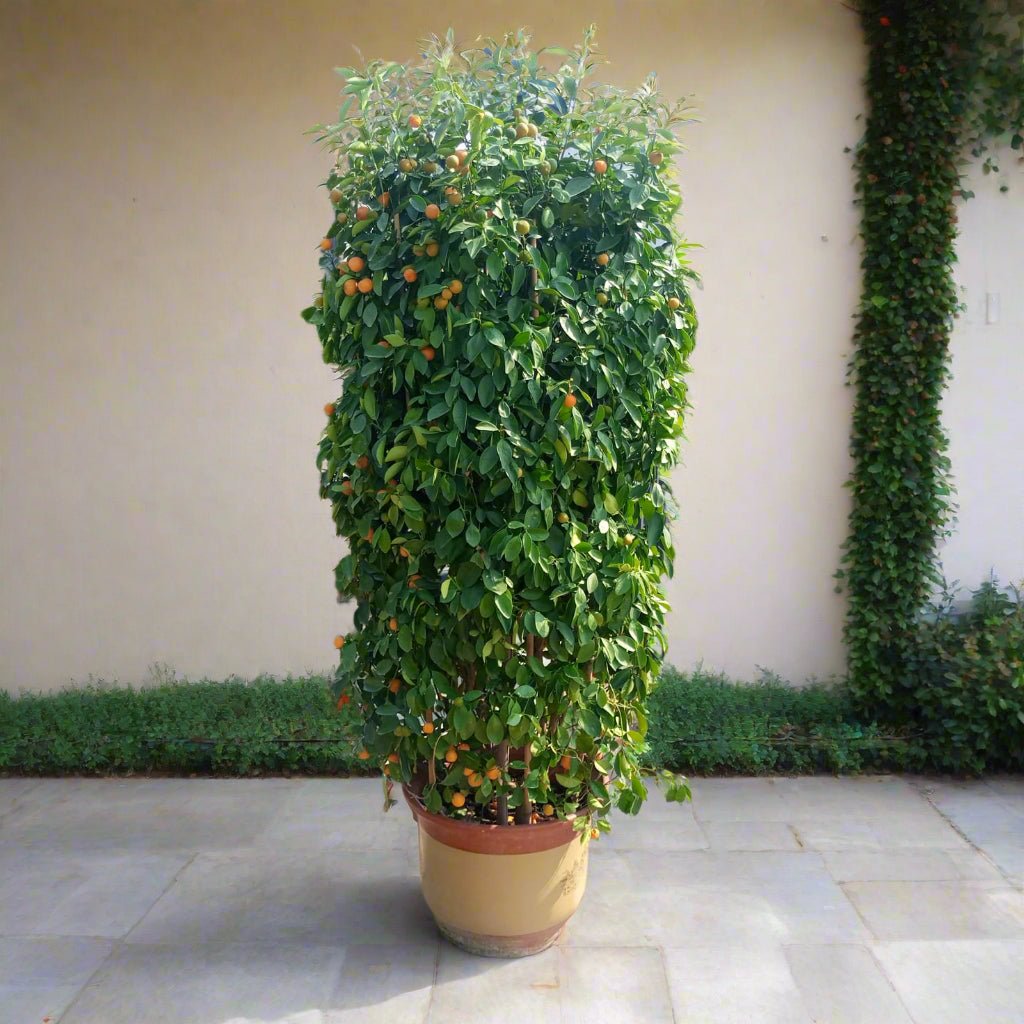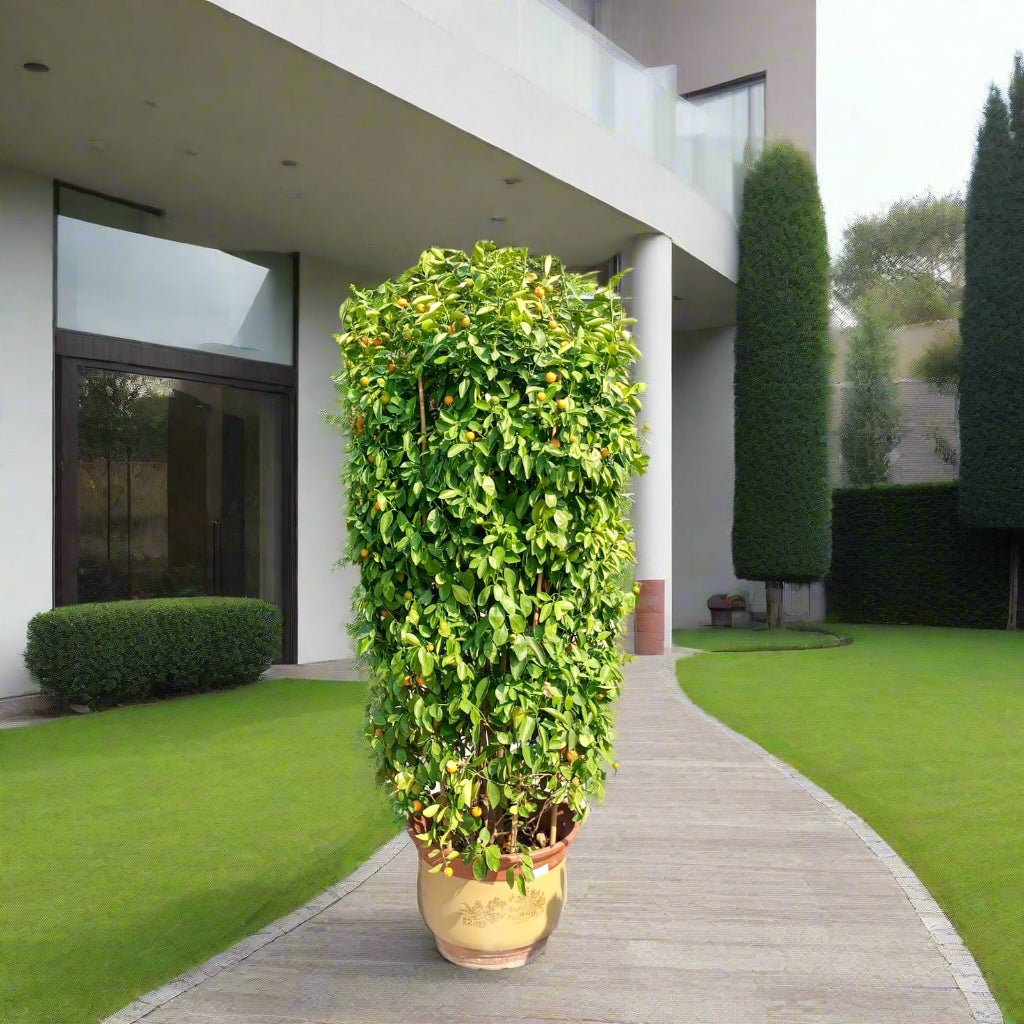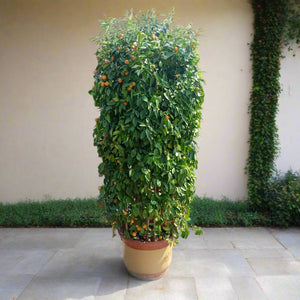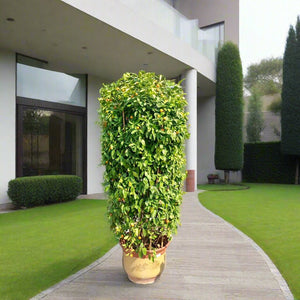Tree Citrus Lemon (Spanish Lemon) | 1.5 - 2.0m
Guarantee Safe Checkout
Website Exclusive - Free Delivery in Dubai & Sharjah
Free replacement if you receive a defective item during delivery
Tree Citrus Lemon Type 1B Standard 18LP 1.5-2.0M, Spanish
Citrus limon, commonly known as the lemon, is a small evergreen tree or shrub that belongs to the Rutaceae family. It is widely cultivated for its tangy and aromatic fruit, which is a key ingredient in culinary, medicinal, and cleaning applications. Lemons are a staple in many cuisines around the world, and their juice, zest, and peel are highly valued.
Key Details About Citrus limon:
1. Appearance:
Size: Lemon trees typically grow to about 10–20 feet (3–6 meters) tall, but they can be kept smaller when pruned, making them suitable for container gardening.
Leaves: The leaves are glossy, dark green, and elliptical with a slightly leathery texture. They are aromatic and release a citrus fragrance when crushed.
Flowers: Lemon trees produce fragrant, white to pale purple flowers, which have a pleasant, sweet scent. They often bloom in spring or fall, depending on the climate.
Fruit: The fruit is bright yellow when ripe, with a thick, dimpled skin. It contains a tangy, acidic juice and is rich in vitamin C. The fruit is divided into segments with numerous seeds.
2. Uses:
Culinary: Lemons are used in a wide variety of dishes, from savory to sweet. Their juice is commonly added to drinks (like lemonade and cocktails), dressings, marinades, and sauces. Lemon zest, the outer peel, is often used to add flavor to desserts, cakes, and other recipes.
Medicinal: Lemons have been used in traditional medicine for their high vitamin C content, which supports the immune system. The fruit also has antimicrobial properties, and lemon juice is used in remedies for sore throats and digestive issues.
Cleaning: Due to their acidity and refreshing scent, lemons are a popular natural cleaning agent. Lemon juice can be used to remove stains, disinfect surfaces, and neutralize odors.
Cosmetic: Lemon juice is sometimes used in beauty treatments, such as skin lightening, treating acne, and as a natural hair treatment.
3. Cultivation:
Climate: Lemons thrive in warm, subtropical to tropical climates. They require plenty of sunlight and are best suited to USDA hardiness zones 9–11. They can tolerate brief cold snaps but are sensitive to frost.
Soil: Lemons prefer well-drained, slightly acidic soil. A loamy, sandy soil mix works well, and it’s important that the soil doesn’t retain too much water to avoid root rot.
Watering: Lemon trees need regular watering but should not be overwatered. It's important to let the soil dry slightly between waterings. In hot climates, they may need deep watering once or twice a week, especially during the growing season.
Fertilizing: Regular feeding with a balanced fertilizer is recommended for lemon trees, particularly during the growing season. Specialized citrus fertilizers are available to provide the necessary nutrients for healthy fruit production.
4. Maintenance:
Pruning: Pruning is important to maintain the shape of the tree, remove dead or diseased wood, and encourage better airflow. This also helps the tree focus its energy on fruit production rather than excessive leaf growth.
Pest Control: Lemon trees can be susceptible to pests like aphids, spider mites, and scale insects. Regularly inspect the tree and use organic insecticides if necessary to control these pests.
Pollination: While lemon trees are self-pollinating, planting multiple trees or encouraging pollinators like bees can help increase fruit yield.
5. Other Characteristics:
Fruit Yield: Depending on the variety and growing conditions, lemon trees can produce fruit year-round or in distinct seasons, typically after 3-5 years of growth.
Varieties: There are several lemon varieties, with the Eureka and Lisbon varieties being the most commonly cultivated. Meyer lemons, a smaller, sweeter variety, are also popular, especially for culinary use.
Container Gardening: Lemons can be grown in pots or containers, which is ideal for those who have limited space or live in cooler climates. Container-grown lemon trees need regular watering and more frequent fertilizing, but they can thrive in a sunny spot on a patio or balcony.
6. Common Problems:
Yellowing Leaves: This can be a sign of nutrient deficiency (particularly nitrogen or iron) or improper watering. Make sure the tree has well-draining soil and provide appropriate fertilization.
Fruit Drop: It’s common for lemon trees to drop some of their fruit naturally, but excessive fruit drop can be a sign of stress, such as overwatering, under-fertilization, or poor pollination.




